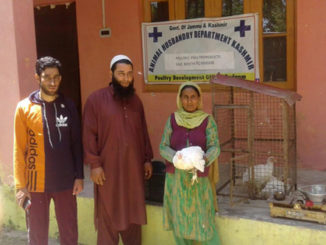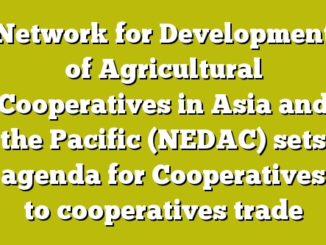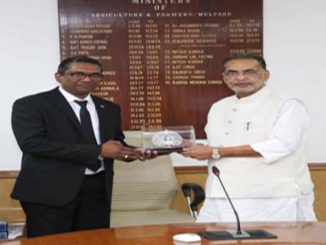12 November 2018: The Union Minister of Agriculture and Farmers’ Welfare, Shri Radha Mohan Singh hailed the efforts of Prof. M. S. Swaminathan, the architect of India’s Green Revolution and said that India is today not only self-sufficient in foodgrains but is also an exporter due to his efforts. Shri Singh appreciated and felicitated Professor M. S. Swaminathan, the recipient of the World Agriculture Prize at an event in Chennai.
The Union Agriculture Minister said that under the ‘Green Revolution’ programme led by Prof. Swaminathan in 1960s and 80s, wheat and rice seeds with better yields were planted in the farmers’ fields. This revolution made India self-reliant in foodgrain in less than 25 years thereby bringing glory to Swaminathan as the scientific leader of India’s ‘Green Revolution Movement’. Shri Singh added that Prof. Swaminathan has won many awards and recently won the World Agriculture Prize conferred by the Indian Council of Food and Agriculture (ICFA) for his research on genetics, cytogenetics, radiation and food and biodiversity conservation.

The Union Minister asserted that the Prime Minister Shri Narendra Modi led government, after taking over in 2014, started working towards all-round development of the agriculture sector. Shri Singh said that it has always been the government’s vision to not only fill the stock of agriculture commodities but also to enhance the income of farmers. In this context, the Dalwai Committee was constituted for doubling farmers’ income. The government is working with a concrete strategy in line with the recommendations of the DFI committee. To reduce the cost of production, the use of soil health card and neem-coated urea and schemes related to “more crop per drop” are being targeted and successfully implemented.
Shri Singh further added that for the first time in 2014-15, the government launched a comprehensive scheme to promote organic farming in the country. Under this, the Paramparagat Krishi VikasYojana (PKVY) is being implemented and Mission Organic Value Chain Development for North Eastern Region (MOVCDNER) is also being implemented as a central scheme for the northeast region considering the possibility of organic farming in this part of the country.
The Union Agriculture Minister reiterated government’s commitment to ensure remunerative price to farmers for their produce. The goal of integrating 585 mandis with e-NAM has been achieved till March 2018. By 2019-20, additional 415 mandis (200 in 2018-19 and 215 in 2019-20) will be integrated with e-NAM. Besides, the government started the Pradhan Mantri Fasal Bima Yojana (PMFBY) from Kharif 2016 to eliminate the risks associated with agriculture.
Shri Singh praised the role of ICAR in achieving the goal of doubling the income of farmers by 2022. In the last three years, high-yielding variety crops that are tolerant to climate change, bio-fortified crops and new animal breeds have been developed. In order to bring self-reliance in the area of pulse production, 150 seed hubs have been set up in the country, resulting in record production of 22 million tonnes of pulses. In order to increase the income of small and marginal farmers of the country, 45 integrated farming system models have been developed, in which special emphasis has been given to livestock farming, poultry rearing and horticulture.
The Union Agriculture Minister further informed that the Rashtriya Gokul Mission has been initiated for conservation and promotion of indigenous breeds. Under this a sum of Rs 546.15 crore has been released to the states till March 31, 2018& called the government’s decision of implementing the hike in MSP by atleast 1.5 times of all Kharif 2018-19 crops as historic thereby fulfilling the promise made in the budget of 2018-19. Shri Singh expressed hope that under the leadership of Professor Swaminathan, the agriculture and food security will continue to be sustainable in the coming years in India and the government will be successful in doubling the income of farmers within the given target.






Be the first to comment